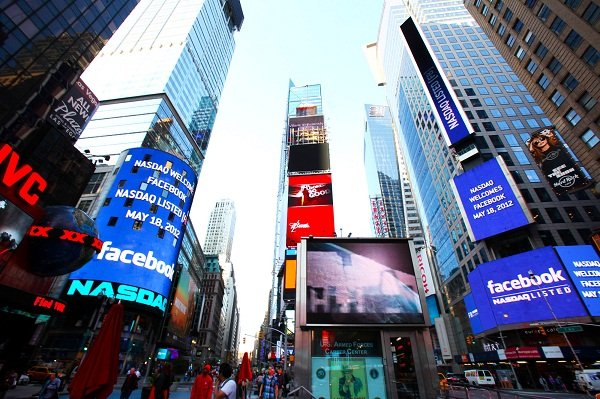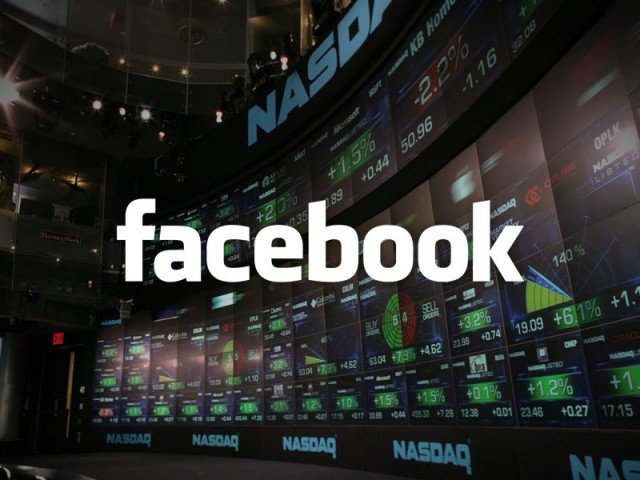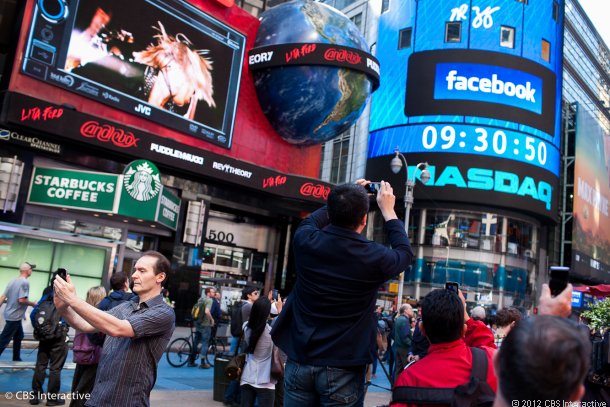Home Tags Posts tagged with "nasdaq stock exchange"
nasdaq stock exchange
Facebook has reported a sharp drop in profits, partly due to increased spending on research and development.
Facebook made a profit of $64 million in the final three months of 2012, compared with $302 million a year earlier.
Revenue was up 40% at $1.6 billion, largely due to a big jump in advertising revenue, a quarter of which came from mobile platforms.
Shares in Facebook fell by almost 6% in after-hours trading in New York.
The shares launched on the Nasdaq stock exchange in May at $38, and had halved in value by September.
They have since recovered to stand at $31 at the close of trading on Wednesday. The drop in after-hours trading suggests the shares will fall back again when full trading resumes on Thursday.
“Mobile revenue was expected to be a little higher,” said analyst Aaron Kessler at Raymond James.
“Overall it’s a solid quarter but maybe [the company has suffered from] high expectations going into the quarter.”

Facebook has reported a sharp drop in profits, partly due to increased spending on research and development
Revenue from advertising was $1.3 billion, 41% up on a year earlier.
Mobile revenue, an important indicator of the company’s ability to capitalize on the growing move towards mobile platforms, accounted for 23% of overall revenue.
“In 2012, we connected over a billion people and became a mobile company,” said Mark Zuckerberg, Facebook founder and chief executive.
“We enter 2013 with good momentum and will continue to invest to achieve our mission and become a stronger, more valuable company.”
Facebook investors have been offered $40 million by the NASDAQ stock exchange for a computer hitch that stopped them trading on debut day.
Some shareholders had hoped to sell the much-hyped shares on the issue day to take advantage of pent-up buyer demand.
But technical problems kept many investors from buying shares in the morning or selling them later in the day.
The payout is meant to reimburse those who lost money because of the fault.
The opening of trading was delayed by half an hour and some investors were unable to tell whether their orders were processed, while others said they were left holding shares they did not want.

Facebook investors have been offered $40 million by the NASDAQ stock exchange for a computer hitch that stopped them trading on debut day
Facebook’s shares went on sale at $38 a share on 18 May, but rose sharply in early trading, something many buyers had hoped to capitalize on by selling during the day.
They ended the day barely above the starting level though, and have floundered since, falling to around $25 a share.
NASDAQ says it will reimburse those who tried to sell into the first-day bounce at $42 or less, but either couldn’t sell or sold at a lower price than they intended.
The $40 million is more than 10 times the $3 million previously paid by NASDAQ for technical errors, but already there have been complaints from some investors it will not be enough to cover losses.
NASDAQ’s chief rival, the New York Stock Exchange, has accused NASDAQ of giving itself an unfair advantage, saying the move gives investors an incentive to move more of their trading to NASDAQ.
In a statement it said: “This is tantamount to forcing the industry to subsidize NASDAQ’s mis-step and would establish a harmful precedent that could have far-reaching implications for the markets, investors and the public interest.”
The exchange added it would “strongly press our views” against the proposal, which has to be approved by the watchdog the Securities and Exchange Commission.
Facebook shares have fallen below $29 for the first time since their flotation to a new low.
The shares were launched at $38 less than two weeks ago during its high-profile flotation, which valued the firm at $104 billion.
Since then, Facebook’s shares have lost almost a quarter of their value.
Russia’s biggest social network, VKontakte, has now postponed its stock market launch, fearing a repeat of Facebook’s problems.
“The IPO of FB [Facebook] destroyed the faith of many private investors in social networks,” said chief executive Pavel Durov in a message posted on Twitter.
Facebook shares fell more than 9% to a low of $28.78.

Facebook shares have fallen below $29 for the first time since their flotation to a new low
One reason for the fall in shares since its initial public offering (IPO) is that Tuesday was the first day that options on Facebook stock began trading.
Options are a form of derivative, that allow bets on the future direction of the stock. It appears that most investors are betting Facebook shares will head lower.
The situation is a remarkable turnaround from recent weeks, when the eight-year-old firm’s share sale was over-subscribed.
The social networking site has transformed the way in which hundreds of millions of people around the world communicate. It is also transforming the way companies advertise to existing and potential customers.
But Facebook’s 900 million users helped the company generate just $1billion in profit last year, and there are concerns about its ability to increase profits in the future.
The flotation was disrupted on its first day of trading by technical glitches on the NASDAQ stock exchange. The share price has since slumped amid worries that the company was over-valued by advisers marketing the float.
Now, a group of investors has issued a class-action lawsuit alleging that Facebook revenues were revised down because of a surge in the number of people using mobile devices for apps and connection to websites.
The suit targets Facebook, its founder Mark Zuckerberg and the banks behind the flotation, including lead underwriter Morgan Stanley.
The share sale in New York raised $16 billion for Facebook.
Recent reports suggested that Facebook is to launch its own smartphone by next year.
Amid a flurry of lawsuits over Facebook’s IPO, Morgan Stanley, the company’s top underwriter, says it’s prepared to pay back investors who were burned when they bought shares.
Morgan Stanley announced in a memo on Wednesday that it is reviewing Facebook trades and would adjust prices for some retail customers who overpaid.
The IPO mishaps have sparked numerous lawsuits against Morgan Stanley, the NASDAQ stock exchange and Facebook itself by shareholders who claimed they hid the social networking company’s weakened growth forecasts just before it went public.
The allegations raised questions about whether top investors profited at the expense of smaller buyers.
Meanwhile, Facebook is in talks with the New York Stock Exchange to move its stock from the NASDAQ Stock Market after the botched IPO on Friday, according to a person familiar with the matter.
The person spoke on the condition of anonymity because they were not authorized to speak publicly.
Facebook’s much-anticipated IPO was delayed by a half-hour on Friday because of technical glitches on the NASDAQ.

Morgan Stanley announced in a memo on Wednesday that it is reviewing Facebook trades and would adjust prices for some retail customers who overpaid
After pricing at $38, Facebook’s stock closed up 23 cents on Friday and has been down since. On Wednesday, it closed up $1, at $32, still down nearly 16% from the IPO price.
NYSE declined to comment.
The news comes as even Facebook CEO Mark Zuckerberg dumped his own shares in the company, making $1.13 billion as the stock nosedived, according to company filings.
On Wednesday, shareholders filed a lawsuit against Facebook and the banks behind the company’s stock, Morgan Stanley and Goldman Sachs.
Additionally, both the Securities and Exchange Commission and the Financial Industry Regulatory Authority have begun looking into the matter.
The U.S. Senate Banking Committee has also launched an inquiry and the state of Massachusetts has subpenaed Morgan Stanley, demanding answers.
The House Financial Services Committee said that it was also gathering information for their own review.
Facebook stock rose 3.3% in trading on Wednesday, rising to $32 a share.
However, a new analysis said the stock could fall to as low as $9.59.
That’s a far cry from the $37.58 that Zuckerberg fetched for 30.2 million shares he unloaded on Friday.
By the end of trading on Tuesday however the price had dropped to $31 meaning Zuckerberg saved himself a cool $174 million by getting out early.
Mark Zuckerberg, 28, still holds a vast amount of Facebook stock but his decision to sell off so much will leave investors wondering about his confidence in the company.
The drop is based around the realization that Facebook might not be growing as quickly as initially thought. And the company’s second-quarter growth will likely fall short of expectations as fewer new users join the social networking giant.
Shareholders filed a lawsuit on Wednesday, alleging that Mark Zuckerberg, Facebook and the banks that backed the Initial Public Offering, Morgan Stanley and Goldman Sachs, knew this information, but weren’t forthcoming with it.
On Tuesday, Reuters revealed that the banks’ analysts downgraded their estimates about the future earnings of the company while they were rolling out the IPO.
Business Insider called the move “unprecedented”.
Furthermore, the website reported that the banks revealed to privileged major investors that the share price was likely to tank, but left smaller stock buyers in the dark about this information.
The Securities and Exchange commission is investigating these allegations and the state of Massachusetts has filed a subpoena demanding Morgan Stanley release information about the IPO.
Facebook’s flotation has run into more controversy amid reports of concerns about the way advisers disclosed information to investors.
As Facebook shares fell another 9% on Tuesday, regulators said they may review the disclosure process to see if some investors got favorable access.
The SEC and regulatory body FINRA both said they would look into the matter.
Morgan Stanley, lead underwriter on the flotation, said it was “in compliance with all applicable regulations”.
Reuters and the Wall Street Journal reported that Facebook’s advisers may have revised their financial forecasts for the social networking company, but that only selected investors were told.

Facebook's flotation has run into more controversy amid reports of concerns about the way advisers disclosed information to investors
Mary Schapiro, chairman of the Securities and Exchange Commission, said “there are issues that we need to look at”.
Richard Ketchum, chief executive of the Financial Industry Regulatory Authority (FINRA), said there were “matters of regulatory concern”.
But in a statement, Morgan Stanley spokesman, Pen Pendleton, said the bank had “followed the same procedures for the Facebook offering that it follows for all initial public offerings”.
Also on Tuesday, a private investor issued a writ against the NASDAQ stock exchange over technical problems on Friday that disrupted Facebook’s first trading day.
Phillip Goldberg, a Maryland resident, is seeking class-action status on behalf of all investors who say they lost money because of the technical problems.
Facebook’s market debut was delayed by about half an hour, and orders to buy or sell shares were further disrupted. Philip Goldberg has filed a writ in the southern district court of New York.
NASDAQ chief executive Robert Greifeld has said that “clearly we had mistakes in the Facebook listing”.
It has all taken the shine off one of the most anticipated flotation in history.
Facebook shares, launched at $38 each on Friday, fell 11% on Monday and a further 9% on Tuesday. The shares are now worth $31 each.
It is a remarkable turnaround from recent weeks, when the social network’s share sale was over-subscribed and the eight-year-old firm was valued at $104 billion.
Much of the blame for the fall in share price is being pinned on lead underwriters Morgan Stanley and the NASDAQ exchange itself, with many commentators saying that the sale was over-priced.
“There must have been some sober second thoughts about this,” said Brian Wieser, an analyst at Pivotal Research.
Brian Wieser thinks a fair price for such a young company without a proven business model is about $30.
But some analysts say the fall is of little consequence in the early days.
“Whether [Facebook] is worth $95 billion or $100 billion, it’s immaterial,” Jeremy Liew of investment company Lightspeed Venture Partners told Reuters.
The social networking site has transformed the way in which hundreds of millions of people around the world communicate. It is also transforming the way companies advertise to existing and potential customers.
But Facebook’s 900 million users helped the company generate just $1 billion in profit last year, and there are concerns about its ability to grow profits in the future.
Facebook shares have fallen in early trading on Wall Street to below the price at which they were floated.
Despite the wider market in buoyant mood, Facebook slid 12% immediately at the opening bell and were still 11% down at $33.92 more than one hour into the trading day.
Facebook’s flotation on Friday at $38 a share was delayed by technical problems on the NASDAQ stock exchange.
NASDAQ boss Robert Greifeld said he was “humbly embarrassed” by the glitch.

Facebook shares have fallen in early trading on Wall Street to below the price at which they were floated
Trading was delayed by 30 minutes due to late order cancellations, and the shares closed on Friday at $38.23, having hit $45 earlier in the day.
The offer price valued the site at $104 billion.
Analysts said Facebook shares were the most frequently traded on Wall Street, but sentiment had changed since Friday.
“One of the things that we are seeing in Facebook is a lot of emotional trading, in that over the weekend much of the media coverage was negative, and that could be weighing on investors’ decisions to get out of the stock,” said JJ Kinahan from stockbrokers TD Ameritrade.
“This was not our finest hour,” said Robert Greifeld.
As a result of the glitch, a number of investors were unsure whether their buy and sell orders had actually gone through.
However, Robert Greifeld said that once the glitch had been fixed, trading had been “successful”.
More than 566 million shares in the company changed hands, a record volume for US market debuts.
Some analysts suggested the share price would have fallen on Friday had it not been for underwriters stepping in to buy up stock.
Strong demand in the run-up to the flotation had led the company to increase both the price and the number of shares available for sale.
Other internet companies have had mixed experiences recently when they have started selling shares.
Online games maker Zynga’s shares fell 5% on their first day of trading in December 2011. However, shares in business networking site LinkedIn more than doubled on their debut in May last year, while Groupon shares jumped 30% on their debut in November.






